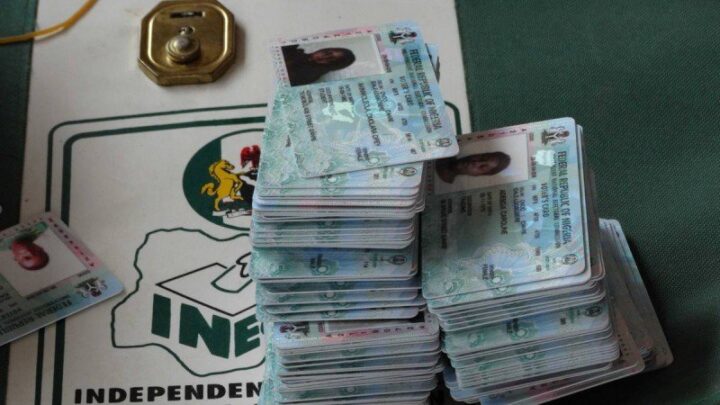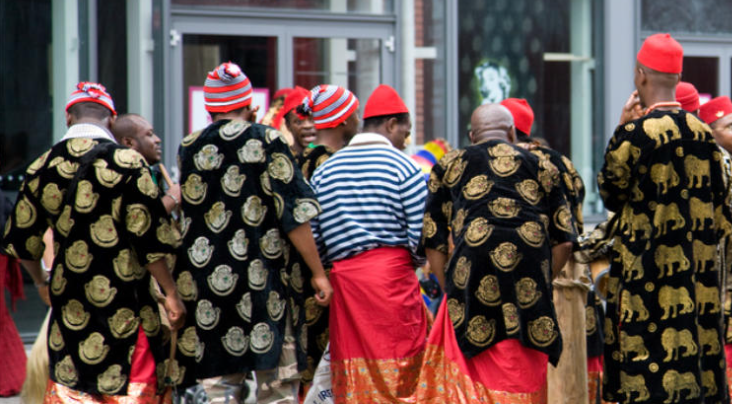graduation cap diploma isolated on a white background
Nigerians can go anywhere, perhaps including hell, in their quest for higher education. They are ready also to invest any amount of money in their educational pursuits. If you doubt this, consider the humongous amounts of pounds that the UK is currently getting from desperate Nigerians in the name of higher education. Tuition fees in the UK often exceed £10,000 a year. This is aside from living expenses. Averagely, international students pay between £15,000 and £25,000, depending on the programme and the university.
Yet thousands of Nigerians are rushing to the UK for studies. As a matter of fact, choosing the education route is one of the easiest ways to leave Nigeria. The UK has made the process very easy and straightforward. Apply to a school, get your admission, make a part payment of your tuition and provide proof that you can sustain yourself and your dependants for the next nine months. At the end of your study, you are free to stay for two years during which you must get a job or you return to your country. If you choose not to return, you can enrol for another programme. You can do that for as long as you want, provided you pay your tuition and meet other conditions set by the Home Office.
If you are a couple, you are free to take your spouse along with you. Your spouse will get a work permit. He/she works so that you will be able to fund your education and take care of other expenses. The UK treats its education as a major export product, so it does whatever is required to make it yield the highest returns for the country. Its focus is currently on Nigerians. It is aware that Nigerians are looking for where to study because of the poor higher educational system at home. It also knows that many Nigerians are looking for greener pastures. So, it has opened its door wide to its educational institutions. It has also put in place checks and balances to protect itself. It is a win-win situation. Nigerians want what the UK has, that is, quality education and good life. And the UK also wants what Nigerians have – our money and probably cheap labour!
While our forefathers were deceived into becoming slaves in sugarcane plantations abroad, Nigerians today are more than pleased to offer themselves as ‘labourers,’ albeit for some time in their search for a better life. To them, their labour will not be in vain because there is a light at the end of the tunnel. After all, this is more promising than the hopeless situation at home.
Advertisement
Can anyone blame them? Life at home is brutish. Aside from insecurity, the unemployment rate has hit the roof. A report published by the National Bureau of Statistics (NBS) in the first quarter of 2021 said Nigeria’s Unemployment Rate rose from 27.1 per cent in the second quarter of 2020, to 33 per cent, making it the second-highest on the global list. The NBS report also shows that ‘more than 60 per cent of Nigeria’s working-age population is younger than 34. Unemployment for people aged 15 to 24 stood at 53.4 per cent and at 37.2 per cent for people aged 25 to 34′.
For the few that are lucky to be employed, the remuneration is very poor. Graduates are paid between N30,000 and N50,000. This is less than $100 per month going by an exchange rate of N610 to a dollar. Casual workers in the UK for instance earn roughly 100 pounds per day- that is about N80,000 per day. Granted the cost of living in both countries are different, Nigeria’s minimum wage of N30,000 is far too low to sustain the cost of living for the average Nigerian which is about N43,200, according to Statista. And the standard of living in the UK is far better. So, how do you compare the two? Isn’t it better to be a slave in the UK than be a free man in Nigeria?
Unfortunately, not many Nigerians can afford the financial investment required for a UK education. So, they are opting for countries that put a lesser financial strain on them. Unfortunately, such countries could be hellish. Just on Tuesday, members of the Nigerian Diaspora Youth Ambassador raised an alarm over the plight of Nigerian students in Northern Cyprus.
Advertisement
According to them, these students are suffering from intense depression due to the inhuman treatment meted to them, giving rise to a high rate of suicide amongst them. The President of the Association, Mr David Alozie, told Dr Abike Dabiri-Erewa, Chairman/CEO, Nigerians in Diaspora Commission, that their visit was to appeal for quick intervention on the plight of these students. In his words “Turkish Republic of Northern Cyprus is not the best place to study, as the majority of the institutions there are not recognised by the European Union (EU) or any country in the world.”
Imagine, these students know that their certificates are worthless outside Northern Cyprus but they still choose to go there anyway because “it is in the abroad” and it is a means of escaping the “shit hole” called Nigeria. This is pathetic. Sadly, many of them get killed in the process and they are simply forgotten.
The students’ expectation of hope was soon dashed when the Nigerian rep advised them to stay back in Nigeria. “It is better for the youths to stay back in their country and be alive than risk their lives in going to a country where unaccountable and unresolved cases of young Nigerians that have been killed and still being killed are being recorded,” Dabiri-Erewa advised.
I guess many Nigerians will easily pick a hole in this piece of advice. First, we know that Nigeria does not guarantee anybody any form of security. Stories of the young Nigerians wasted by terrorists on the Kaduna-Abuja-bound train are still fresh in our memory. Besides, we have lost count of students in Boko Haram enclaves across the country. When these terrorists strike, they don’t release all their victims – they keep some behind. An overwhelmed government desperate for credibility go to town over the few releases and forget about the remaining victims. We move on until another kidnap case is reported. Here, citizens get kidnapped at random. One does not even need to go out before they are abducted. Kidnappers go to people’s homes to steal them for ransom. So how safe is Nigeria really? A nation where the president’s convoy is attacked by bandits and terrorists attack prisons to free their members without a hindrance? These are the things that citizens suffer when you have an irresponsible government.
Advertisement
But, must we continue like this? Are Nigerian higher institutions irredeemable? Must we continue to enrich other countries at our own expense? What stops this country from making its higher education work? What can we do to stop incessant strikes by the academics and other unions in our higher institutions? A certain Nigerian called Malik stirred the hornet’s nest on Tuesday with this tweet: “University of Birmingham tuition fee for PGD ~ N10,430,000.00k, Abubakar Tafawa Balewa University tuition fee for PGD ~ N110,500.00k. But my fellow Nigerians want our universities to be like that of those in the UK.’’
The tweet caught my attention and I read others’ reactions to it. Someone said he paid less than N40,000 per year at Obafemi Awolowo University, Ile-Ife. By the way, I learnt OAU charges the cheapest accommodation fee among all federal universities in Nigeria. Hostel accommodation fee is between N5,000 and N10,000 per student per annum!
Another person said, “I paid 136k as an undergraduate, and it is not easy for my family to pay such an amount for two children. I still have some of my mates that can’t afford to pay their tuition fee.’’
“Everything over there is working perfectly where the citizens can afford it. There are students’ loans and grants, even scholarships. The moment the citizens there can afford to pay the tuition fee, there is nothing to prove. Can some Nigerians afford the N110,500k you mentioned?’’ another person said in his reaction.
Advertisement
“Empower the people before you tax them. People in the US can afford to send their wards to the university of $25,000 tuition because they earn far above that. Even when they can’t, they have alternatives (Student Loan). How much is Nigeria’s minimum wage? Why is $1 = N615?”
Others that reacted were just plain angry and abusive. “If only you have sense you won’t come up with this tweet, ppl like you are why we are campaigning for PETER OBI to give you good education to think.” “Did you compare their income per capita? They are thriving well and can afford the fees! Nigerian politicians got us to this stage and now comparing the carcass of their actions with the UK! So dumb!’’
Advertisement
Another said, ‘Well, pls add that, the amount is for foreign students. I am in the UK studying. What you gain from that amount. NEVER CAN ANY Nigeria UNIVERSITY GIVE u THAT. FOR their citizens, you can access that at a lower fee and can pay only when you start working. Can Nigeria do that?”
Others think the fees are expensive for UK citizens as well, hence the reason why they take loans to pay their fees while some say that Nigeria’s tuition is too low to demand the foreign standard of university education, arguing that “the more you pay, the more value you get”; “The fees of some private primary and secondary schools in Nigeria are far higher than all public universities, public tertiary institutions are damn too cheap in Nigeria…’’; “Until we face the real fact of funding sustainability, we shall continue to go in circles and strikes will be what ASUU will give to shortchange the students and their parents.”
Advertisement
The take-home for me from this Twitter thread is the urgent need for a meaningful conversation around the funding of higher education in Nigeria. All the people aspiring to lead Nigeria in 2023 should tell us how they intend to fund our higher institutions. Until we explore potential revenue streams and resources outside of government funding for Nigeria’s higher education, other countries will continue to take advantage of our foolishness and cluelessness.
Already, the number of youths pursuing higher education in Nigeria is too low compared to our population. Nigeria has 39.9 million people aged 15-24 years. Of that number, just about 2.1 million students are enrolled in higher institutions as at 2021. We don’t need a statistician to tell us that something is wrong with this figure.
Advertisement
Yet, Nigerians are flocking to other countries for higher education. Just recently, a Canadian university boasted of producing all-Nigerian Masters of Law students. Many of us were excited about the news report but we didn’t bother to ask ourselves why the Canadians shunned the law programme. Could it be because it isn’t a good investment of their time and money?
There is no point in deceiving ourselves. The main reason for going abroad for many Nigerians is not just to earn a degree. It is simply a vehicle of escape! The earlier we initiate the real conversation on the funding of our higher institutions, the better it would be for every one – both as a nation and a people!
Olabisi Deji-Folutile (PhD) is the editor-in-chief of franktalknow.com and a member of the Nigerian Guild of Editors. Email: [email protected]
Views expressed by contributors are strictly personal and not of TheCable.
Add a comment







